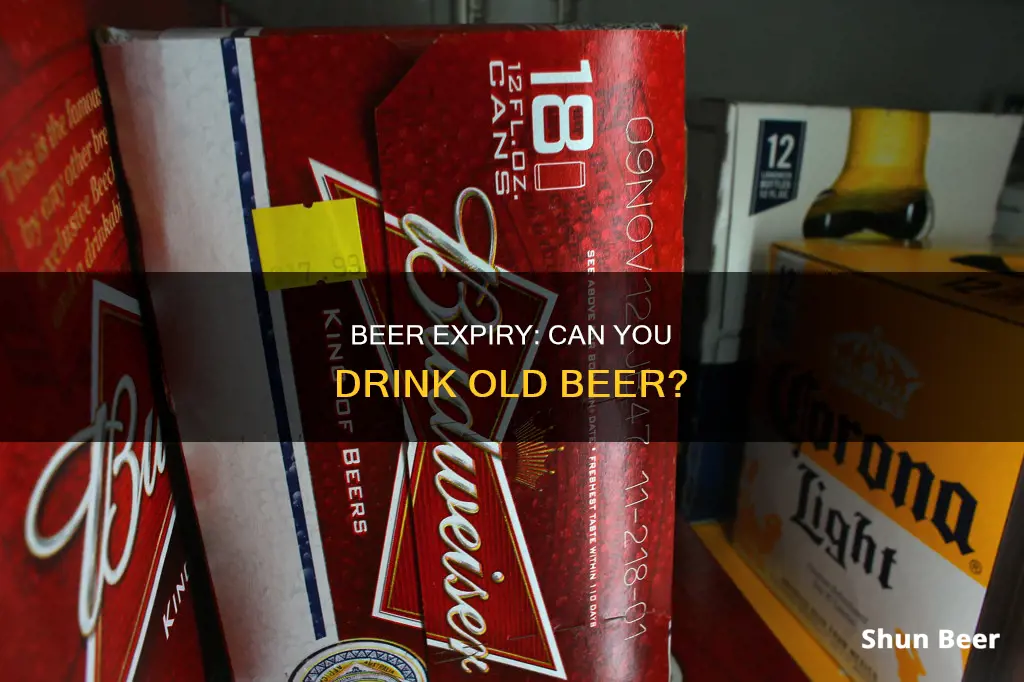
Beer typically has a 'best before' date, which is a guideline on quality rather than safety. This means that the beer will start to lose its quality after the stated date, but it can still be consumed. Beer can be drunk months after its best before date if it has been stored correctly, and some beers can even improve with age. However, the flavour of beer can deteriorate over time, especially for lighter beers.
What You'll Learn

Beer doesn't expire, but it can go bad
Beer doesn't expire in the same way that food does. There are no known pathogens that can live in beer, so drinking old beer won't make you sick. However, old beer can still go bad, and the flavour and quality will degrade over time.
The shelf life of beer varies depending on the type of beer and how it is stored. Beer stored in a refrigerator will last longer than beer stored at room temperature. Beer stored in brown bottles will last longer than beer stored in clear or green bottles, as brown glass offers more protection against ultraviolet light, which can cause beer to develop a skunky odour and taste. Canned beer will also last longer than bottled beer, as cans prevent light from entering and maintain an airtight seal better.
High-alcohol beers, such as stouts and porters, tend to have a longer shelf life than light beers like lagers and pilsners. Hoppy beers, like IPAs, are best consumed fresh, as the volatile aromas from hops are one of the first things to break down as beer ages.
You can tell if a beer has gone bad from the colour, smell, taste, foam density, and overall appearance. If the beer has a bad aroma, or is missing the usual sound and foaming at the top when you open it, it has likely gone bad. You can also look at the bottom of the bottle for excessive sediment, which can contribute to a poor taste.
Chug Beer Like a Pro: Tips to Drink Fast
You may want to see also

It's safe to drink old beer, but it might not taste good
It's generally safe to drink beer that's a few months old—even if it's past its "best before" date—but it might not taste very good.
Beer typically has a "best before" date rather than a "use by" date. While "use by" is a rule and indicates that food or drink will quickly degrade and could make you ill if consumed after this date, "best before" is more of a guideline on quality. This means that beer will start to lose its quality after the stated date but can still be consumed.
Beer doesn't expire in the same way that food does. Because of the alcohol content and the presence of hops, which have antimicrobial characteristics, there's no real pathogen growth in beer. So, while old beer might not taste good, it's unlikely to make you sick.
However, there are a few things to keep in mind. Firstly, different styles of beer have different shelf lives. High-alcohol, malt-forward styles like barley wines and imperial stouts are sometimes brewed with aging in mind and can be cellared for a couple of years. On the other hand, hop-heavy styles like IPAs are best consumed fresh, as the volatile aromas from hops tend to dissipate over time.
Secondly, light exposure can cause beer to develop a skunky odour and taste, so it's best to keep beer out of sunlight and store it in dark bottles or cans.
Finally, while old beer is usually safe to drink, it's still possible for it to go bad. You can tell if beer has gone bad from the colour, smell, taste, foam density, and overall appearance. If it has a bad aroma, or it's missing the usual fizz and foam when you open it, it's probably best to avoid drinking it.
Drinking Three Beers Daily: Is It Safe?
You may want to see also

Beer should be stored in a cool, dark place
Beer is the world's third most popular drink, and it's easy to see why. But, if you want to make the most of your beer, it's important to store it correctly. Beer should be stored in a cool, dark place. But why?
Firstly, beer is susceptible to light exposure, especially UV light. When UV rays interact with acidic hop compounds, they create a chemical reaction, producing a noxious chemical similar to what a skunk sprays. This is why light exposure can give beer a "skunky" taste. Even a short time spent outside in direct sunlight can affect the flavour of your beer. Beer should be kept away from direct sunlight, and even light from windows can impact its flavour.
Secondly, temperature is important. Beer should be kept at a cool, consistent temperature. Long-term exposure to high temperatures can make beer go stale quickly. However, beer can stand up to modest temperature swings, so it's fine to chill beer for a party and then let it warm up again. Beer should ideally be stored at temperatures between 50 and 55 degrees Fahrenheit (10-13°C).
So, where should you store your beer? The best place is in a refrigerator, ideally at a temperature of 34 to 36 degrees Fahrenheit (1-2°C). If you don't have the fridge space, a cool, dark place such as a basement or closet is a good option.
To ensure your beer stays fresh, it's also important to store it upright to preserve oxidation and carbonation levels.
Drinking Beer from Mason Jars: Is It Okay?
You may want to see also

Light and temperature fluctuations can negatively impact beer
Beer is sensitive to light and temperature changes. These fluctuations can negatively impact the beverage, so it's important to store beer correctly to maintain its quality and freshness.
Light Sensitivity
Beer is sensitive to light, especially ultraviolet (UV) rays and the visible light spectrum. Exposure to light can cause a chemical reaction, interacting with isomerized hop compounds to produce 3-methylbut-2-ene-1-thiol (3-MBT). This results in an unpleasant "skunked" flavour and aroma, also known as "lightstruck" beer. The skunked aroma is often described as resembling cannabis or cat pee.
To prevent light-related issues, brewers typically package beer in amber-coloured bottles, as they block more UV light than clear or green bottles. Fermentation vessels should also be kept out of direct sunlight or covered to avoid producing off-flavours.
Temperature Fluctuations
Temperature is a critical factor in beer storage, as it significantly affects the chemical profile and flavour of the beverage. The general rule is that higher temperatures accelerate the ageing process, causing the beer to taste old and stale. This is due to the increased rate of chemical reactions, particularly oxidation, which creates the chemical Trans-2 Nonenal, associated with the wet paper or cardboard aroma of old beer.
Storing beer at lower temperatures helps preserve the freshness and slows down the ageing process. According to Craft Beer USA, "beer stored at 100°F for one week tastes as old as beer stored at 70°F for two months, or as old as beer stored at 40°F for one year." Thus, keeping beer refrigerated is essential to maintain its freshness and flavour.
Additionally, temperature fluctuations themselves can impact beer quality. Changes in temperature can affect the flavour profile, turning a light IPA into a caramel one or a pilsner into a pale ale. Therefore, it is crucial to store beer at a consistent, cool temperature to prevent undesirable flavour changes.
In summary, light and temperature fluctuations can negatively impact beer by causing chemical reactions that alter the flavour and aroma. To maintain the quality and freshness of beer, it should be stored in a cool, dark environment, with minimal exposure to light and temperature changes.
Liquor After Beer: Is It Safe?
You may want to see also

Canned beer lasts longer than bottled beer
Beer typically has a "best before" date, which is a guideline on quality rather than safety. While it's not dangerous to drink beer past this date, it may not taste as good. Beer can last for long after its "best before" date, especially if it's been kept in the fridge.
The caps on beer bottles can also break down over time, allowing air into the bottle. In contrast, cans are sealed and prevent exposure to sunlight, helping to maintain the beer's freshness and flavour.
In summary, while beer doesn't typically "expire", its flavour can degrade over time. Canned beer is better protected from the elements and will therefore last longer than bottled beer.
Beer and Kidney Pain: Is There a Link?
You may want to see also
Frequently asked questions
No, drinking old beer will not make you sick. Beer doesn't have any pathogens that can cause illness. However, it may not taste very good.
Beer can last 6-24 months past its best-before date if it's been kept in the fridge. If it hasn't been refrigerated, it will only last up to 9 months.
There are a few signs that your beer has gone bad. Check for a bad aroma, a lack of the usual 'pssst' sound and foaming when you open it, or excessive sediment at the bottom of the bottle.







